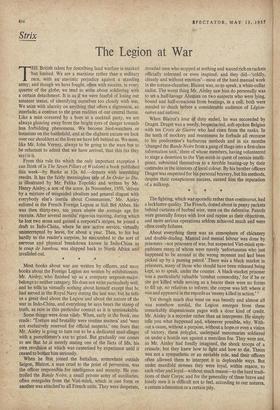Strix
The Legion at War
THE British talent for describing land warfare is marked but limited. We are a maritime rather than a military race, with an atavistic prejudice against a standing army; and though we have fought, often with success, in every quarter of the globe, we tend to write about soldiering with a certain detachment. It 'is as if we were fearful of losing our amateur status, of identifying ourselves too closely with war. We seize with alacrity on anything that offers a digression, an interlude, a contrast to the grim realities of our central theme. Like a man cornered by a bore at a cocktail party, we are always glancing away from the bright eyes of danger towards less forbidding phenomena. We become bird-watchers or botanists on the battlefield, and at the slightest excuse we look over our shoulders at the lives we have left behind us. We seem, like Mr. John Verney, always to be going to the wars but to be reluctant to admit that we have arrived, that this (as they say) is it. From this rule (to which the only important exception 1 can think of is The Seven Pillars of W isdom) a book published this week—by Burke at 12s. 6d.—departs with interesting results. It has the fairly meaningless title of In Order to Die, is illustrated by Mr. Feliks Topolski and written by Mr. Henry Ainley, a son of the actor. In November, 1950, 'driven by a mixture of misguided idealism and general disgust with everybody else's inertia about Communism,' Mr. Ainley enlisted in the French Foreign Legion at Sidi Bel Abbes. He was then thirty-two, ten years above the average age for recruits. After several months' rigorous training, during which he lost two stone and gained a corporal's stripes, he joined a draft to Indo-China, where he saw active service, virtually uninterrupted by leave, for about a year. Then, to his but hardly to the reader's surprise, he succumbed to the sort of nervous and physical breakdown known in Indo-China as le coup de bambou, was shipped back to North Africa and invalided out.
* * * dreaded men who stopped at nothing and waxed rich on rackets officially tolerated or even inspired; and they did—`coldly, cleanly and without emotion'—most of the hard manual work in the torture-chamber. Blairot was, so to speak, a white-collar sadist. The worst thing Mr. Ainley saw him do personally was to set a half-savage Alsatian on two suspects who were lying, bound and half-conscious from beatings, in a cell; both were mauled to death before a considerable audience of Legion- naires and natives.
When Blairot's tour of duty ended, he was succeeded by Draget. Draget was a weedy, bespectacled, soft-spoken Belgian with ten Croix de Guerre who had risen from the ranks. In the teeth of mockery and resentment he forbade all recourse to his predecessor's barbarous methods and in six months `changed the Bande Noire from a gang of thugs into a first-class information unit,' three of whose members, having volunteered to stage a desertion to the Viet-minh in quest of certain intelli- gence, submitted themselves to a terrible beating-up by their comrades in the interests of local colour. By his brother officers DragetWas respected for his personal bravery, but his methods, despite their conspicuous success, earned him the reputation of a milksop.
The fighting, which was sporadic rather than continuous, had a lacklustre quality. The French, dotted about in penny packets behind curtains of barbed wire, were on the defensive. Patrols were generally forays with loot and rapine as their objectives, and more serious operations seldom achieved much and were often costly failures.
About everything there was an atmosphere of chidanery and double-dealing. Manual and menial labour was done by prisoners—not prisoners of war, but suspected Viet-minh sym- pathisers many of whom were merely 'unfortunates who just happened to be around at the wrong moment and bad been picked up by a passing patrol.' There was a black market in prisoners, many of those who should have been released being kept, so to speak, under the counter. A black-market prisoner was a particularly valuable 'combat commodity,' for if he or she got killed while serving as a bearer there were no forms to fill up, no relatives to inform; the corpse was left where it was and appeared in the records as 'enemy killed in action.' ' Yet though much that went on was beastly and almost all was somehow sordid, the Legion emerges from these remarkably dispassionate pages with a dour kind of credit. Mr. Ainley is a recorder rather than an interpreter. He simply tells you what happened and, whenever possible, why. With- out a cause, without a purpose, without a hopehor even a vision of victory, these polyglot, underpaid mercenaries soldiered on under a hostile sun against a merciless foe. They were not, as Mr. Ainley had fondly imagined, the shock troops of a crusade; but they knew how to fight and how to die. Theirs was not a sympathetic or an enviable role, and their officers often allowed them to interpret it in deplorable ways. But under manifold stresses they were loyal, within reason, to each other and loyal—without much reason—to the hard tradi- tions of their Corps; and for the generality of these brave and lonely men it is difficult not to feel, according to our natures, a certain admiration or a certain pity.


































 Previous page
Previous page